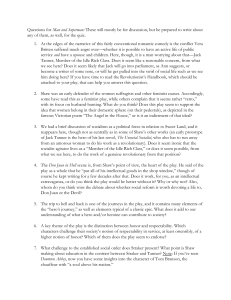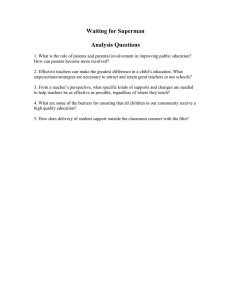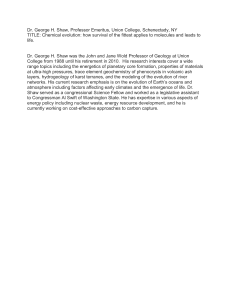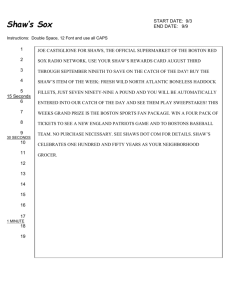Man and Superman review – Ralph Fiennes masters Shaw’s contrary...
advertisement
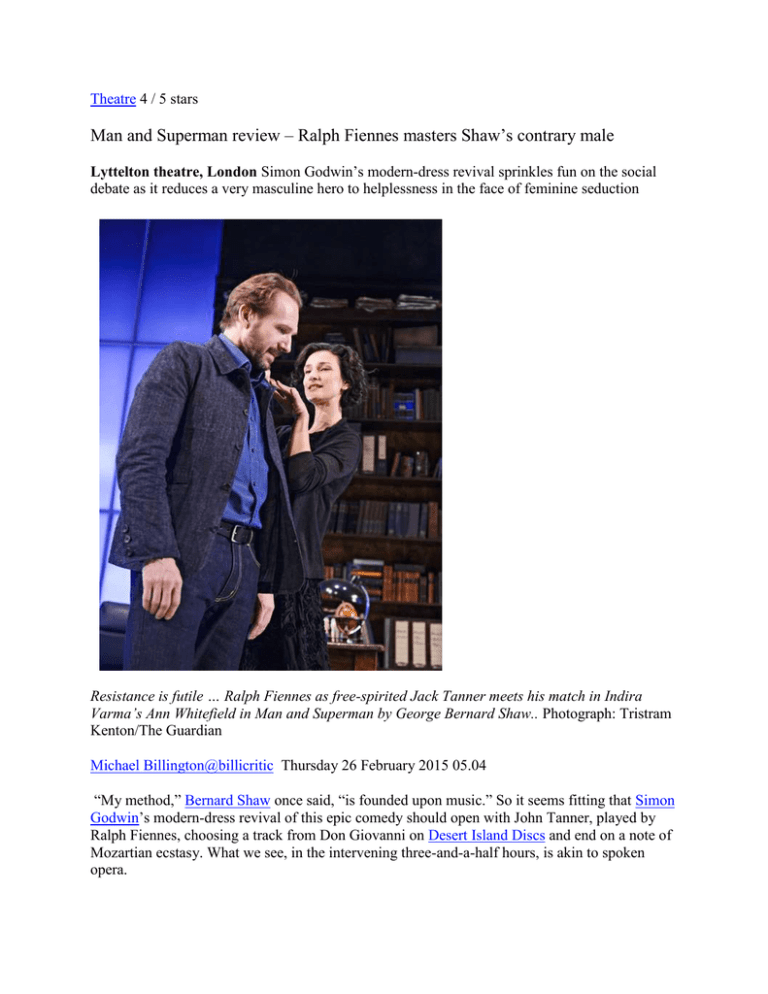
Theatre 4 / 5 stars Man and Superman review – Ralph Fiennes masters Shaw’s contrary male Lyttelton theatre, London Simon Godwin’s modern-dress revival sprinkles fun on the social debate as it reduces a very masculine hero to helplessness in the face of feminine seduction Resistance is futile … Ralph Fiennes as free-spirited Jack Tanner meets his match in Indira Varma’s Ann Whitefield in Man and Superman by George Bernard Shaw.. Photograph: Tristram Kenton/The Guardian Michael Billington@billicritic Thursday 26 February 2015 05.04 “My method,” Bernard Shaw once said, “is founded upon music.” So it seems fitting that Simon Godwin’s modern-dress revival of this epic comedy should open with John Tanner, played by Ralph Fiennes, choosing a track from Don Giovanni on Desert Island Discs and end on a note of Mozartian ecstasy. What we see, in the intervening three-and-a-half hours, is akin to spoken opera. At first, I had doubts about Godwin’s updating. The comedy of the first two acts depends heavily on Shaw’s exposure of social hypocrisy and reversal of theatrical conventions. He was, after all, writing in 1901-03 when Tanner’s revolutionary ideas, as well as the notion of an unmarried woman getting pregnant, might have seemed faintly shocking: today we take them in our stride. In the second act we see Tanner fleeing by car to Spain to escape the clutches of the pursuing heroine, Ann Whitefield. But the joke about the chauffeur who is wiser than his employer belongs to a period in which other comedies, including JM Barrie’s The Admirable Crichton, pointed up the helpless dependency of the rich. What is astonishing about Godwin’s production is that it triumphs where Shaw’s play is most difficult. The stumbling-block, often omitted, is usually the prolonged Don Juan In Hell scene: a dream-sequence where Tanner morphs into the famous libertine and a Spanish brigand into the devil. Not only is it all talk but Shaw’s ideas about woman’s role in fathering a new Superman now seem, rather dubiously, to be holding the mirror up to Nietzsche. But the debate is here animated by superb staging, with designer Christopher Oram’s glass wall taking on mutliple colours and allowing us a shadowy glimpse of the future products of what Tanner calls the Life Force. Shaw’s ironic joke is that Don Juan spouts endlessly about intellect and will but, back in the real world, Tanner is helpless before Ann Whitefield’s amorous pursuit. In a masterly performance, Fiennes catches all Tanner’s contradictions. He brings out precisely, with left leg thrust eagerly forwards, the vanity and arrogance in Tanner’s proclamation of his revolutionary principles. Translated into Don Juan, he argues the case for creative evolution with passion and urgency. But he is at his funniest in the final act when, confronted by Ann’s ardour, he exudes an impotent despair. The trickiest role, in some ways, is Ann herself. She is obviously intended to be a strong woman and force of nature. By casting Indira Varma in the role, the production gives her a sexual glamour that makes Tanner’s pretended resistance look palpably absurd: what Varma also catches excellently is Ann’s mix of calculation and charm. There is a supremely funny performance from Tim McMullan as both a helplessly lovelorn Spanish brigand and a suavely ironic Devil who holds court in Hell over a lavishly endowed drinks trolley. And, in a play rich in supporting characters, there is good work from Faye Castelow as a hard-headed romantic fugitive and Nicholas Le Prevost as a deep-dyed conservative who imagines himself an advanced thinker. Even I, as an ardent Shavian, would concede there are moments when you wish the old boy would get a move on. But his wit, often funnier than that of Wilde, endures. So too, whatever we think of his ideas, does the felicity of his prose which, as he intended, achieves the seductive rhythm of music. Review: Ralph Fiennes Tears Into Shaw’s ‘Man and Superman’ in London By MATT WOLFMARCH 11, 2015 From left, Tim McMullan, Indira Varma, Ralph Fiennes and Nicholas le Prevost in George Bernard Shaw’s ‘‘Man and Superman’’ at the National Theater. Credit Johan Persson LONDON — It may seem strange at this late date to talk about a new Ralph Fiennes, given that this superb actor has been at the center of the British theater and screen industries for more than two decades. But watching Mr. Fiennes seize the stage and then hold it across more than three hours in the National Theater’s rousing new production of “Man and Superman,” I felt as if an actor I’d longknown had been reborn. It’s not just that a bearded Mr. Fiennes looks somewhat like George Bernard Shaw, whose mammoth, dizzyingly discursive play proves a supreme fit for an actor whose rhetorical skills are second to none. One senses in addition that the comic aplomb he brought to the concierge Gustave in “The Grand Budapest Hotel” has perhaps released from within Mr. Fiennes a giddiness that one wouldn’t have thought likely in view of the severity of his early work. Whatever the reason, the actor tears into the role of the loquacious bachelor Jack Tanner in Shaw’s rarely performed 1903 play with a gleeful abandon, turning a potentially long haul into a largely happy one. Presented in neatly filleted form by the director Simon Godwin — who proved a dab hand when he pared down Eugene O’Neill’s “Strange Interlude” at this same theater two summers ago — “Man and Superman” emerges afresh as an expansion upon “Much Ado About Nothing.” The reluctantly coupled Benedick and Beatrice of Shakespeare’s comedy are here re-imagined as the proto-revolutionary Jack and the heiress Ann (Indira Varma), a coolly watchful younger woman who gets Jack as a guardian following her father’s death. A rather chilly Ms. Varma doesn’t always justify the play’s focus on Ann’s amorous well-being, while Nicholas le Prevost, playing Ann’s other and still-older guardian, displays a discomfort with Shaw’s language that only shows up Mr. Fiennes’s ease in bolder relief. Let loose on the play’s inversion of the “Don Juan” saga, Mr. Fiennes ensures that prolixity has rarely sounded so pungent. “I’m in the grip of the life force,” Jack tells Ann as his heart gives way, to which, on this evidence, the response can only be that it takes one to know one: Mr. Fiennes constitutes a theatrical force all his own. http://www.nytimes.com/2015/03/12/arts/international/review-ralph-fiennes-tears-into-shawsman-and-superman-in-london.html?_r=0 REVIEW / Time flies in well-trimmed 'Superman' By Robert Hurwitt Published 4:00 am, Monday, July 9, 2007 Photo: Kim Komenich L to R, Ben Livingston plays Octavius Robinson, Susannah Livingston plays Ann Whitefield and Elijah Alexander plays Jack Tanner as the California Shakespeare Theater of Orinda performs "Man and Superman." Photo by Kim Komenich/The Chronicle ** Livingston, Susannah Livingston, Elijah Alexander Directed by Jonathan Moscone. The heat wave that swept the Bay Area last week came crashing to an end just in time to turn a potentially pleasant Saturday opening night at California Shakespeare Theater into three hours of biting cold. No matter. The skill of the performers, the charm of Artistic Director Jonathan Moscone's stagings and the wit of George Bernard Shaw made the time spent with "Man and Superman" seem positively balmy. It isn't as easy a feat to pull off as it might seem. "Superman" is one of Shaw's cleverest and most provocative scripts. Its interplay of evolutionary, philosophical and sexual politics, wrapped around a woman-gets-her-man comedy, remains stimulating a century after it was written. But it's also one of his talkiest and longest plays. The full text, with its famed "Don Juan in Hell" dream sequence intact, can run about five hours. Most companies cut it pretty heavily, sometimes omitting "Don Juan." But pruning Shaw is complicated. Berkeley Rep managed to reduce the running time to about 3 3/4 hours in 1990, but ended up with a rather flat "Don Juan" remnant in the midst of a lively, appealingly trimmed "Superman." The Oregon Shakespeare Festival's truncated "Superman," a few years earlier, was much less engrossing than its separately staged "Don Juan." Moscone, dramaturge Laura Hope and company have followed the Berkeley Rep approach (on which Moscone assisted director Irene Lewis), pruning excess and sometimes precious verbiage from the entire text, more thoroughly -- by another half hour -- but more judiciously. The result is a streamlined comedy of ideas and romance that seems to fly by at a relaxed clip, with most of the speeches trimmed so expertly that the longer ones stand out like tour de force arias of penetrating wit. There are actual arias, too. Moscone graces Shaw's devilish remake of the Don Juan legend with the principals lip-syncing snatches of Mozart's "Don Giovanni" to cover the scene changes. There's a musical motif in the curlicued arch that frames Annie Smart's stunning, canary-yellow set design as well, with its period-perfect furnishings (and roadster) set off against the rolling hills and greenery beyond the open stage. Anna R. Oliver's Edwardian frock coats, flowing gowns and lacy parasols help set the tone of the story's "idle rich class." There's nothing idle in the performances. What energizes this "Superman" is the scintillating, multilayered interaction between Elijah Alexander -- as Jack Tanner, the single-minded revolutionary and resolutely celibate philosopher of sexual freedom and human evolution -- and Susannah Livingston (nee Schulman) as the seemingly proper, intensely vital Ann Whitefield, who's made up her mind to marry him. Alexander's intellectually swaggering Jack may be the alpha male, but he's no match for Livingston's tenaciously focused Ann. As peremptory as he is brilliant, boyishly brash, insightful and comically naive, Alexander makes Jack's ideas -- about social hypocrisy, gender roles, the evolution of more intelligent humans (the superman) -- both sharply witty and electric with excitement. Livingston's Ann amplifies the appeal of his words, listening with an increasingly aroused interest that seems less carnal than ever more determined that he will father her children. The intensity of their connection carries through "Don Juan" -- the philosophical dialogue in which Jack and Ann become Juan and his Doña Ana in a dreamy hell -- as his words help transform her into an embodiment of Shaw's Life Force. Ann is the prime mover of the action, sweetly manipulating her crusty guardian (a forceful L. Peter Callender, also Ana's easygoing father in hell) and helplessly malleable mother (a drily comic Nancy Carlin), as she fends off the proposals of a smitten, romantically poetic Octavius (a beguilingly ineffectual portrait by Ben Livingston, Susannah's husband, in his Cal Shakes debut). Delia MacDougall provides sharp thematic counterpoint as Octavius' no-nonsense sister, cementing her marriage to a wealthy American (an engaging T. Edward Webster). Dan Hiatt and Steve Irish help fill out the very strong cast, and Andy Murray is superb as the devil, matching wits with Jack/Juan in brilliant arias of hedonism and disgust at human cruelty. The energy in this interplay of ideas is a large part of the success of Moscone's "Superman." It isn't just that he's created a fine balance between the play of ideas and its surrounding comedy; in his orchestration of the performances and their underlying emotions, Moscone has integrated Shaw's elements into a whole greater than the sum of its parts -- a super "Man and Superman." http://www.sfgate.com/entertainment/article/REVIEW-Time-flies-in-well-trimmed-Superman2582076.php July 18, 2007 Arts & Culture » Theater The Shaw Must Go On : Cal Shakes stages a manageable Man and Superman. By Sam Hurwitt needs now is less Neil Simon and more George Bernard Shaw. Tempting, but also probably inaccurate. Shaw's rapier wit, all the sharper because it's to a purpose rather than for its own sake, is enthralling when done well, but a mediocre performance can make it feel talky even for a medium mostly constructed of dialogue, particularly for contemporary audiences unused to lengthy four-act plays. Fortunately, Jonathan Moscone's California Shakespeare Theater production of Man and Superman is done very well indeed. Trimmed to a manageable three hours or so, the dialogue sparkles, and the cast is mostly superb. Annie Smart's set frames tasteful period furniture with high-yellow abstract curves that slightly suggest musical notation, with versatile painted screens to capture the view. A bald-headed bust of patriarch Roebuck Ramsden doubles cleverly as an entry pillar to the estate. Anna R. Oliver's elegant Edwardian costumes immediately establish not only time and place but class — the "idle rich class," as protagonist Jack Tanner would have it. The play takes the form of a comedy of manners in the sense of satirizing the pretensions of polite society, but goes much deeper than that, skewering sanctimonious morality in no uncertain terms. The terms are explained by the passionate Jack, a young man of privilege and a self-styled anarchist obsessed with exposing moral hypocrisy. He goes into his ideas at such length that today he would doubtless have a PowerPoint presentation at the ready, and indeed the published play is accompanied with the full text of Jack's own incendiary pamphlet, The Revolutionist's Handbook and Pocket Companion. For that reason this is more properly an "idea play," because it spends more time on philosophical debate than on the plot per se. The story itself might be regarded as a romantic comedy that strains against its nature at every turn. Love and marriage are regarded with fatalistic resignation by Jack, who sees them as things against which he can struggle for independence, but to which he ultimately must succumb out of Darwinian necessity. And besides, it's the women who really call the shots. As Ann Whitefield, Susannah Livingston leaves little doubt that she's entirely in control while insisting innocently that she's nothing of the kind, with an impish air of mischief radiating through her ladylike veneer. Married in secret so as not to endanger her source of income, Delia MacDougall's savvy, self-assured Violet has the men around her eating out of her hand, with a keen eye for social propriety and fiscal calculation. Nancy Carlin is a model of civilized resignation as Ann's long-suffering mother. Elijah Alexander brings an excellent admixture of cockiness and conviction to the role of Jack as well as his ancestor Don Juan. As his strait-laced old school chum Octavius "Tavi" Robinson, Ben Livingston makes a good-humored straight man for Jack and becomes a lovesick puppy around Ann. L. Peter Callender is a delight as both stodgy, sputtering Ramsden and the commander's statue from the Don Juan tale turned boisterous epicurean in the afterlife. As chauffeur Henry Straker, Dan Hiatt shows an employee's good manners winning out over a quiet sense of proletarian superiority. (Quiet, that is, until Jack explains: "This chap has been educated. What's more, he knows that we haven't.") Andy Murray is a hilariously romantic bandit leader, presiding over a group of brigands who spend most of their time debating political theory, and a suave and indulgent Devil. Often cut from this play and sometimes staged by itself, the long, self-contained third-act scene Don Juan in Hell abruptly shifts to the afterlife for a philosophical debate between Don Juan and the Devil. It's here that the Superman of the title is brought up in an almost parenthetical reference to the philosophy of Nietzsche. There's a reason Plato's dialogues aren't often staged as plays, and the arguments and counterarguments do drag on. But Moscone's inventive staging keeps things lively, with the Devil as a lounge lizard in a red smoking jacket, attended by leather cabana boys. Though the rest of the play is in period dress, Hell is a timeless place where we can see Doña Ana (Susannah Livingston again, naturally) drinking a Tab. Moscone adds a number of amusing touches such as characters lip-synching to Mozart's Don Giovanni during scene changes, and a vintage motorcar fleeing the scene in miniature. But even the more extravagant touches work with Shaw's own humor, never against it, and it all makes for a sumptuously satisfying, beautifully realized comedy that talks up to you rather than down. As one audience member was overheard to say during intermission: "Now I know where every episode of Frasier came from." http://www.eastbayexpress.com/oakland/the-shaw-must-go-on/Content?oid=1083837
